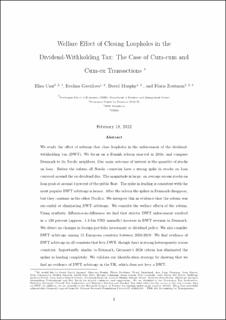Welfare Effect of Closing Loopholes in the Dividend-Withholding Tax: The Case of Cum-cum and Cum-ex Transactions
Working paper

Åpne
Permanent lenke
https://hdl.handle.net/11250/2980688Utgivelsesdato
2022-02-22Metadata
Vis full innførselSamlinger
- Discussion papers (FOR) [566]
Sammendrag
We study the effect of reforms that close loopholes in the enforcement of the dividend withholding tax (DWT). We focus on a Danish reform enacted in 2016, and compare Denmark to its Nordic neighbors. Our main outcome of interest is the quantity of stocks on loan. Before the reform all Nordic countries have a strong spike in stocks on loan centered around the ex-dividend day. The magnitude is large: on average excess stocks on loan peak at around 4 percent of the public float. The spike in lending is consistent with the most popular DWT arbitrage schemes. After the reform the spikes in Denmark disappear, but they continue in the other Nordics. We interpret this as evidence that the reform was successful at eliminating DWT arbitrage. We consider the welfare effects of the reform. Using synthetic difference-in-difference we find that stricter DWT enforcement resulted in a 130 percent (approx. 1.3 bln USD annually) increase in DWT revenue in Denmark. We detect no changes in foreign portfolio investment or dividend policy. We also consider DWT arbitrage among 15 European countries between 2010-2019. We find evidence of DWT arbitrage in all countries that levy DWT, though there is strong heterogeneity across countries. Importantly, similar to Denmark, Germany’s 2016 reform has eliminated the spikes in lending completely. We validate our identification strategy by showing that we find no evidence of DWT arbitrage in the UK, which does not levy a DWT.